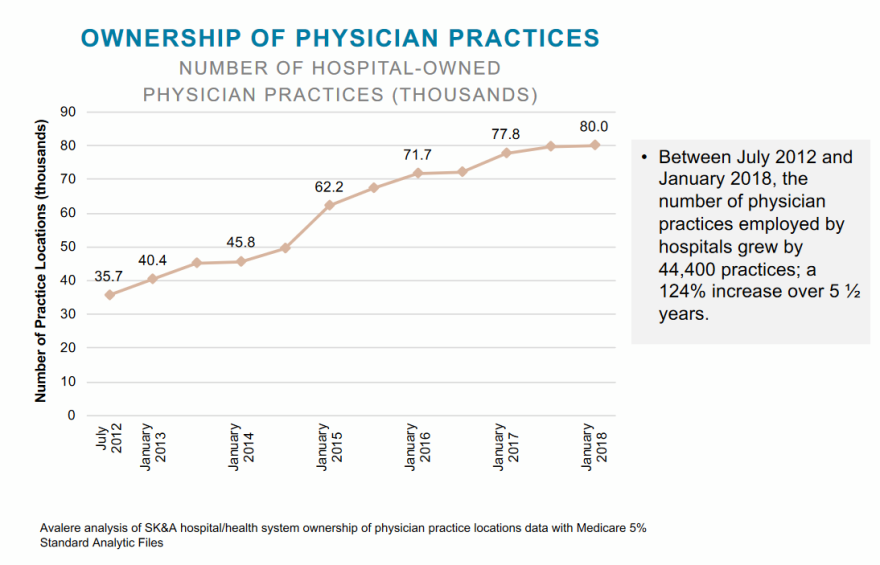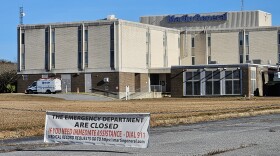Dr. Joanne Fruth knocked on the exam room door and walked in with a warm smile on her face.
"Hi Jamie, it's Doctor Fruth, it's so good to see you," she said. "So you're here for a wellness visit?"Fruth rolled her chair over to sit next to her patient, Jamie Kelly, and the two went over a checklist to asses Kelly's health.
"I like to tell people that what we do as primary care doctors is we just gather little grains of sand. So what we are going to do today is gather all the little grains of sand to try to help build the foundation of your good health," said Fruth.

This afternoon wellness checkup took place at the Oberlin Road office of Avance Primary Care in Raleigh. From the outside, Avance Care looks like and shares many similarities with other primary care practices. But it's different in one very important way: It's not owned by a health system. And that puts it in an ever shrinking class of providers.
Over the past decade, many doctors have sold their primary care practices to hospital systems. That often-difficult choice is driven by increased regulations from the Affordable Care Act, difficulty in negotiating rates with private health insurers and more.


A recent study from the Physicians Advocacy Group found that the number of hospital-owned practices in the U.S. more than doubled from 2012 to 2018. And close to half of all doctors are now employed by a hospital. That's up from just one quarter of doctors earlier this decade.
Levi Boyd, Avance Care's chief financial officer, says the independence frees them of any pressures from a parent hospital. "Being completely independent, having no financial relationship with hospitals health systems or specialists, we can do what's right for the patient and try to bend that cost curve," he said.
When private practices join hospital groups, they often say it's due to an increase in back office work and bigger financial risks that have crept up over the past decade. The North Carolina Medical Society represents the state's physicians and practices. The organization doesn't advocate for one ownership structure over the other, but chief executive Robert Seligson says he understands the benefits physicians see in joining a large system.
"There's a lot pressures put on doctors that are in a private practice setting that don't have a lot of people that can do some of these things for them," he said. "It puts a lot of stress and strain on them. And so they look to an environment in which − it's different − but also one in which they hopefully have more time to devote to practicing medicine, giving their time to treating patients as opposed to meeting all the new regulatory demands and changes and having to negotiate with the plans and things like that."
That's why practices that want to stay independent have had to grow. Avance, for instance, has 14 practice locations and now sees more than 60,000 patients per year, up from 4,000 patients in 2010. Boyd acknowledges that the group can't just sit stagnant.
"No question, you've got to have resources and size does matter," he said. "And that's why we're trying to grow. Grow our patient panel grow our provider panel, and be able to have more of those systems and technologies and tools to be able to help patients."

But staying independent is important to doctors in the practice like Fruth, who in addition to seeing patients is the group's medical director.
"I've worked for three of the health systems in the community, and you don't see that support for the provider," she said. "But here, we have made that our focus where she doesn't have to go somewhere else down another part of Raleigh to see a dietary consultant or a nutritionist or a dietician. You know, it's 10 feet from here."
But even in growth, independent practices have to keep the feel of a smaller shop. After all, that's one of the main value propositions to patients like Kelly. "I don't feel like a number and I don't feel rushed when I come. I've come with my two kids in tow when I had pneumonia. They never make me feel like I'm a burden or that they're in a hurry to get to the next patient. Or that it's not beyond them to stay after hours if something needs to be done."
Regulatory and financial pressures are likely to only increase in health care. But Boyd, Fruth and the rest of Avance Care, not to mention other independent practices in North Carolina, say they will look to take on those challenges without selling to a bigger health system.









